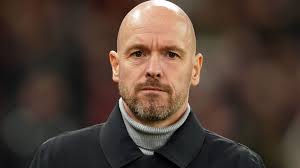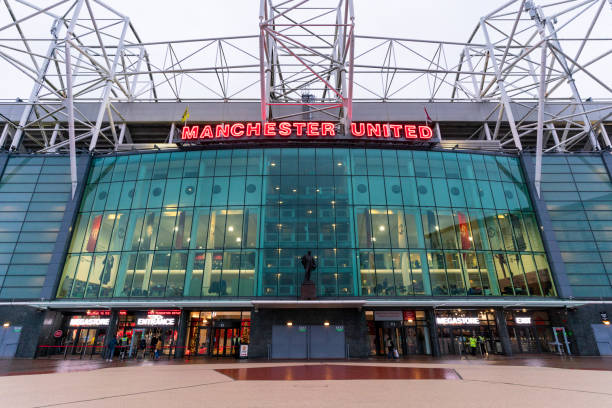Manchester United has officially parted ways with manager Erik ten Hag, marking an unexpected yet perhaps inevitable decision as the club seeks a new direction amid mounting pressure and inconsistent results. The announcement, which came on the heels of a string of disappointing performances, has sent shockwaves through the football community, as ten Hag was widely seen as a potential long-term solution to Manchester United’s managerial instability.
Ten Hag’s Tenure: A Season of Ups and Downs

Erik ten Hag took over Manchester United in the summer of 2022 after a successful stint with Ajax, where he led the Dutch club to multiple Eredivisie titles and a UEFA Champions League semi-final. His arrival was met with optimism, as United supporters believed he could bring the attacking, high-pressing football that had been a hallmark of his teams. However, despite initial successes and glimpses of promise, the team struggled to consistently execute ten Hag’s tactical vision, particularly in high-stakes matches.
Under ten Hag’s leadership, Manchester United initially seemed on the path to recovery, with solid performances in the Premier League and cup competitions. His emphasis on nurturing young talent and creating a cohesive, high-pressing system gave fans hope that he could restore the club to its former glory. However, as the season wore on, mounting injury concerns, tactical inconsistencies, and off-field issues took their toll. By the time of his departure, United found itself outside the top four in the league and struggling to make headway in European competition.
Tactical Struggles and Dressing Room Discontent
Despite flashes of brilliance, ten Hag’s tactical approach faced scrutiny, particularly against top-tier teams. Known for his high pressing, quick ball movement, and reliance on technical, adaptable players, ten Hag encountered difficulty in implementing this style with a United squad that had been assembled by several previous managers, each with a different philosophy. Key players seemed unable to adapt, leading to a sense of disjointedness on the pitch, especially in critical games.
Reports from within the club hinted at discontent in the dressing room, with some players allegedly frustrated by ten Hag’s rigorous demands and sometimes critical public comments. While ten Hag had been brought in with the expectation of implementing a structured approach, his efforts to instill discipline may have had mixed effects. For instance, some senior players reportedly questioned his tactical decisions and substitutions, while others felt underutilized or uncertain about their roles.
Financial Pressure and Boardroom Dynamics
Beyond tactical issues, Manchester United’s ongoing financial challenges may have played a role in ten Hag’s departure. Recent heavy investments in the transfer market put the club under pressure to secure Champions League football, and failure to do so would have significant financial repercussions. The United board, headed by CEO Richard Arnold and partially influenced by the Glazer family, was eager for quick results. The board was reportedly divided on giving ten Hag more time versus taking decisive action to address the club’s current struggles and prevent further loss of revenue.
The strain was further compounded by off-pitch controversies, such as contract disputes, concerns about high player wages, and uncertainty surrounding the club’s ownership. With potential buyers rumored to be circling, the Glazers may have felt it prudent to stabilize the club’s performance in order to attract or retain investment.
Fan Reactions: Divided but Resigned
United fans have expressed mixed reactions to ten Hag’s sacking, with some believing he should have been given more time to reshape the squad and instill his philosophy. Others argue that, despite his accomplishments at Ajax, ten Hag never fully grasped the enormity of the Premier League or the unique challenges that come with managing a club like Manchester United.
The decision has led to considerable debate among United supporters, with some seeing it as a step backward in the club’s pursuit of stability and sustained success. Long-time fans, who have witnessed a revolving door of managers since Sir Alex Ferguson’s retirement in 2013, are frustrated by what seems like a lack of strategic vision from the top.
What’s Next for Manchester United?
With ten Hag now out, attention turns to who will take over at Old Trafford. Several names are already being circulated as potential replacements, including free-agent manager Zinedine Zidane, who brings a wealth of experience and success from his time at Real Madrid. Mauricio Pochettino, who has long been linked to the club, is another name that frequently resurfaces in United’s managerial discussions. An interim manager could also be an option if the club needs more time to make a permanent appointment.
United’s leadership now faces the challenging task of identifying someone who can not only bring immediate results but also develop a cohesive style and mentality for the team. In addition, the new manager will likely need to overhaul the squad and address the dressing room dynamics that reportedly plagued ten Hag’s tenure.
Conclusion: Another Chapter in Manchester United’s Post-Ferguson Saga
Erik ten Hag’s sacking is yet another chapter in Manchester United’s turbulent post-Ferguson era, where managerial change has become all too common. The decision reflects the urgent need for stability and clarity at the club, both on and off the pitch. While ten Hag’s brief tenure may not have yielded the transformative impact many had hoped for, it serves as a reminder of the immense pressures that come with managing one of the world’s most storied football clubs.
Manchester United’s future remains uncertain, but fans and analysts alike will be closely watching to see if this latest change can finally set the Red Devils on a path back to consistent success, or if it will continue the cycle of short-term solutions and unfulfilled potential.


